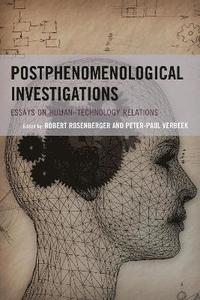
- Format
- Inbunden (Hardback)
- Språk
- Engelska
- Antal sidor
- 282
- Utgivningsdatum
- 2015-05-20
- Förlag
- Lexington Books
- Medarbetare
- Kiran, Asle (contributions)/Ihde, Don (contributions)/Langsdorf, Lenore (contributions)/Besmer, Kirk M. (contributions)/Hoel, Aud Sissel (contributions)/Carusi, Annamaria (contributions)/Nizzi, Marie-Christine (contributions)/Secomandi, Fernando (contributions)/Kiran, Asle (contributions)/Ihde, Don
- Illustrationer
- Illustrations, unspecified; Tables; Charts; Halftones, Black & White including Black & White
- Dimensioner
- 235 x 158 x 22 mm
- Vikt
- Antal komponenter
- 1
- Komponenter
- 9:B&W 6 x 9 in or 229 x 152 mm Case Laminate on Creme w/Gloss Lam
- ISBN
- 9780739194362
- 548 g
Postphenomenological Investigations
Essays on HumanTechnology Relations
- Skickas från oss inom 7-10 vardagar.
- Fri frakt över 249 kr för privatkunder i Sverige.
Passar bra ihop
De som köpt den här boken har ofta också köpt Who's Afraid of Gender? av Judith Butler (inbunden).
Köp båda 2 för 1750 krKundrecensioner
Fler böcker av författarna
-
Moralizing Technology
Peter-Paul Verbeek
-
What Things Do
Peter-Paul Verbeek
-
User Behavior and Technology Development
Peter-Paul Verbeek, Adriaan Slob
-
The Moral Status of Technical Artefacts
Peter Kroes, Peter-Paul Verbeek
Recensioner i media
This collection provides an excellent overview of current work in one of the most important current approaches to the philosophy of technology. . . .The editors' summaries of the sixteen essays provide the reader with a helpful roadmap of the book's organization and content. . . .This is a well-conceived and articulated book and certainly one that both advances studies in the philosophy of technology and contributes to new ways of thinking about phenomenology. * Notre Dame Philosophical Reviews * [The book] is well referenced, and key texts are well signposting, meaning that a lateral rather than linear read may be more productive for newcomers to postphenomenology. * Centre for Medical Humanities * This book is a major contribution to the sparse body of knowledge in the Western philosophical tradition dealing with the foundations of a field of scholarly research. Here the case is so-called postphenomenology, which owes so much to Don Ihde, who provides a brilliant introduction. The two co-editors are equally important, and represent researchers in both the United States and Europe, whose contributions constitute much of the volume. -- Paul Durbin, University of Delaware This anthology is an absolute must for newcomers as well as those versed in the field and its discussions. The book shows how far the burgeoning field of postphenomenological analysis has come since the broader and largely technology-deterministic approaches made by the phenomenological predecessors, most prominently Martin Heidegger. Both novices and those already acquainted with this philosophical style of analysis get plenty of new food for thought in essays addressing technological agency, speed, ethics, humanoid robots, bodies, science fiction, politics, philosophy of design, and scientific practice, as well as a number of brilliantly executed and informative case studies. -- Cathrine Hasse, University of Aarhus
Övrig information
Robert Rosenberger is assistant professor of philosophy at the Georgia Institute of Technology. Peter-Paul Verbeek is professor of philosophy of technology and chair of the Philosophy Department at the University of Twente.
Innehållsförteckning
1. A Field Guide to Postphenomenology, Robert Rosenberger & Peter-Paul Verbeek 2. Why Postphenomenology Needs a Metaphysics, Lenore Langsdorf 3. What Robotic Re-embodiment Reveals about Virtual Re-embodiment: A Note on the Extension Thesis, Kirk M. Besmer 4. Thinking Technology With Merleau-Ponty, Aud Sissel Hoel & Annamaria Carusi 5. Movies and Bodies: Variations of the Embodied Self in Science-Fiction Techno Fantasies, Marie-Christine Nizzi 6. Bodies as Technology: How Can Postphenomenologists Deal with the Matter of Human Technique?, Fernando Secomandi 7. Four Dimensions of Technological Mediation, Asle H. Kiran 8. Tracing the Tracker: A Postphenomenological Inquiry into Self-Tracking Technologies, Yoni Van Den Eede 9. A Century on Speed: Reflections on Movement and Mobility in the 20th Century, Sren Riis 10. Searching for Alterity: What Can We Learn From Interviewing Humanoid Robots? Frances Bottenberg 11. Postphenomenology of the Robot Medical Student, Chris Kaposy 12. Mediating Multiplicity: Brain-Dead Bodies and Organ Transplant Protocols, Adam M. Rosenfeld 13. Towards a Hermeneutics of Unveiling, Jan Kyrre Berg Friis 14. Making the Gestalt Switch, Andrew Feenberg 15. Postphenomenology with an Eye to the Future, Diane Michelfelder 16. Stability, Instability, and Phenomenology, Albert Borgmann


